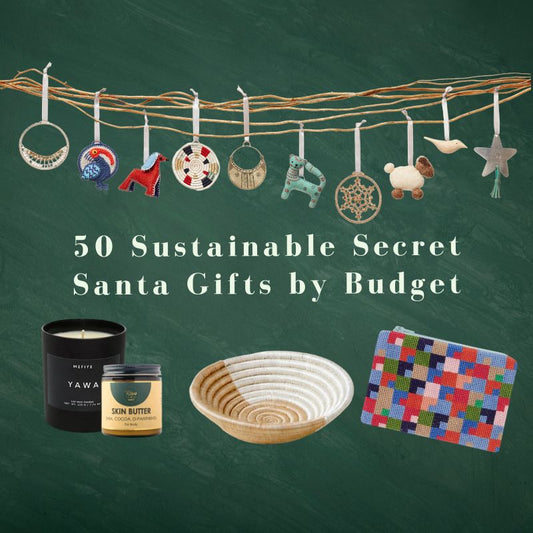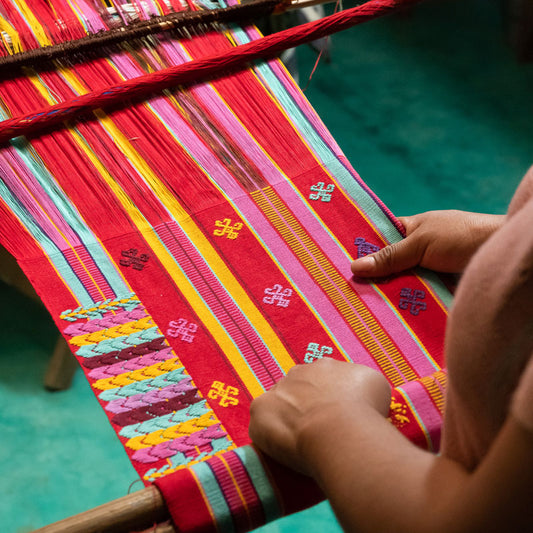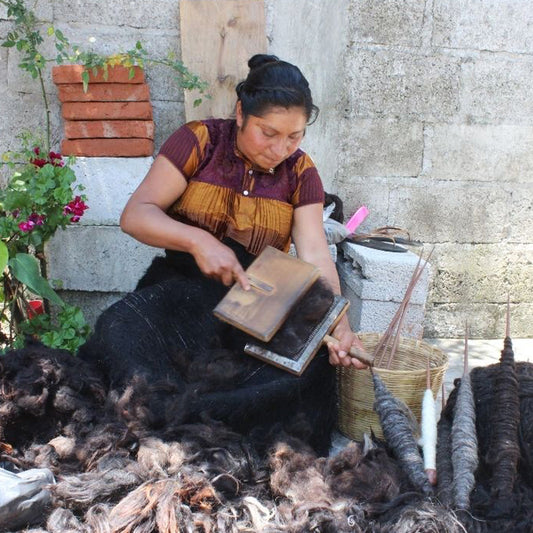Did you know that each year, £42 million worth of unwanted Christmas gifts and the equivalent of 108 million rolls of wrapping paper are sent to landfill in the UK alone! Find Christmas gifts that don't cost the planet and that your recipient will cherish for years to come with these 7 simple tips.

We all love to spoil our loved ones at Christmas. There’s nothing quite like the anticipation of handing over a gift and that moment of joy (or sometimes relief!) when a smile lights up the recipient’s face.
Yet as much as we love it, festive gifting can have a dark side too. The stress of finding the perfect Christmas gift in time. The time (and money) spent on getting through your list. The waste that arises from the endless packaging, the rolls of wrapping paper, and the unwanted Christmas gifts that end up in landfill (an estimated £42 million each year in the UK alone).
The constant pressure to get your Christmas presents now “before they’re all gone” can lead to buying simply for the sake of buying, with little thought given to how the product was made, who it was made by, or, even, whether the recipient themselves will really like it.
The good news is, Christmas gifting doesn’t have to be a stressful or negative experience. We believe that you can show someone you love them, without taxing the earth and its people. That done right, gifting can be a positive experience – for everyone involved.
And so, we present our guide to ethical and sustainable Christmas gifting. The tips and tricks we’ve picked up over the years to take the stress out of gifting, cut down on waste, and make finding a gift that considers the planet, maker and of course, the recipient, easy.
1. Consider the interests of your recipient
The first rule when it comes to buying a sustainable Christmas gift is to think about who you are buying for and what they like. It sounds simple enough, but how many times have you found yourself left wondering what to do with a well-intentioned but, let’s face it, somewhat unwanted present.
Does your recipient love selfcare? Then perhaps they’d like a natural body crème or fragrant essential oil candle. Are they big on entertaining? Sustainable tableware such as handwoven placemats or recycled glassware are sure to go down well.
Taking five minutes to think about what they really like will not only save you minutes (or even hours!) of endless scrolling, it will help you to find a present that the recipient really wants and can cherish for years to come.

2. Prioritise practicality
When in doubt, a failsafe method to ensure your present remains out of the regifting pile, is to choose a gift that has a purpose or function. Try to think about how the gift might be used: will it make their daily life easier? Is it easy to store? Will they use it again and again?
And practical doesn’t have to mean boring. There are plenty of unique gifts that have a purpose. Say these timeless cat eye sunglasses for instance. Or this versatile handwoven storage basket. Choosing practical gifts is an especially good option for those hard to shop for people!

3. Will it last?
Now it’s no good putting thought into how and whether the recipient will use the gift if it doesn’t last. And this counts for both quality and style. Avoid fads and trends and instead opt for pieces that are made using high quality materials and have a timeless appeal.
A good tip for finding high quality gifts is to shop from independent brands and makers who take pride in their work. You’ll find these lovingly made pieces will far outlive their fast, mass-produced counterparts and will stand the test of time when it comes to style.
Admittedly, this can mean a higher price point in some cases. But at least you’ll know it is money well spent, supporting brands that are making quality products and giving a gift that is made to last. And there’s nothing to stop you joining forces with another person to make your money go a little further.
Ps. Want to make that gift last even longer? Check or ask for care instructions so that you can pass them along to the receiver.

4. Check the label
Every product has an environmental and social impact. Starting from when the raw material is extracted from the ground right up to how it is disposed at the end of its life. We know how difficult it can be to navigate the constant green and eco-friendly claims (see this blog for a downlow on all things greenwashing and tips on how to spot it) but a good place to start can be to check the product label and brands website for a little more information.
Look for brands that are transparent about their supply chains, have clear labelling and back claims with evidence. Or find a trusted marketplace (like us!) who vet all their brands and do the hard work for you. In the meantime, here are a few things you can look out for.
What is it made from?
What a product is made of and how that material is sourced can be a big indicator of how sustainable it is. Look for products made using natural renewable fibres, like wool and sisal, upcycled materials, like these repurposed brass hoops, or offcuts and scrap fabrics, like these zero waste scrunchies.
How is it made?
Sustainable manufacturing practices focus on minimising negative environmental and social impacts. How much energy and water is being used to make the product? Are they being made to last or easily repaired? What happens to any offcuts and surplus materials? The best manufacturing processes are those that work in harmony with nature, such as slow handcraft processes and those using renewable energy and resources.
Who made it?
Behind every product is a person or group of people. Support brands that prioritise the health and wellbeing of their employees. Are their workers paid living or above living wage? Do they promote good working conditions? Do they practice fair and equal hiring? You may need to go beyond the label and onto the internet for this one, but a truly ethical business should be transparent about their supply chain and ethics.
Take it one step further and seek out brands engaging in social impact and environmental projects to find a gift that keeps on giving.

5. Be organised – think ahead!
We’ve all been there. Time creeps up on us and before you know it, you’re buying your dad yet another scarf, hoping he’ll see the last five years of scarves as an endearing tradition.
For many of us, panic-buying is a familiar foe, with at least 40% of Brits admitting to leaving their Christmas shopping until last minute. But not only is leaving a gift until last minute stressful, more often than not it’s more expensive (hands up if you’ve ever forked out the extra cash to just get the job done, or at least to try make it arrive in time) and the gift isn’t quite as good as what you had mind.
Our advice – think ahead! Make a list and spend a minute or two on each to think about what they really want. And there’s no need to buy everything at once, break the list down and stagger your purchases to make it more friendly on your wallet.
6. Does it have meaning?
We all have the pieces that make us smile when we see them. That transport us back to a particular moment in time or have a story we love to share with friends and family.
One thing we’ve learnt over the years, is that people are much more likely to hold onto objects with meaning. Whether that’s the place it came from, an interesting technique used to make the piece, or a personal story between you and the recipient. These are the details that make us cherish an object and proud to display them in our home.

7. Signed, sealed, delivered
Now you’ve thought about the product, it’s important to think about packaging: both how the product is packaged itself, and also, the all-important wrapping of the present.
There’s no denying that Christmas has a waste problem. The UK alone sends approximately 114, 000 tonnes of plastic packaging to landfill each year. In addition to that, Brit’s bin an equivalent of 108 million rolls of wrapping paper every year!
When buying a gift, check how the item is packaged, and if ordering online, how it will be delivered. If you can help it, avoid unnecessary plastic packaging, and look for brands embracing eco-friendly solutions with minimal packaging, and recycled and recyclable materials.
When it comes to wrapping, reuse what you already have like a magazine, scarp fabric or parcel paper, take a leaf out of Japanese wrapping traditions and use Furoshiki (a square cloth or scarf will work), or if you do buy wrapping paper, choose a recycled option. A little resourcefulness will also help you to save money.
That’s a wrap!
If there are any tips that you have when it comes to giving ethical and sustainable Christmas gifts let us know and we can add them in. In the meantime, happy gifting!




